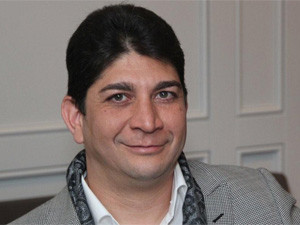
Vodacom, SA's largest cellphone company, with about half the market, has invested R9.5 billion across all its operations in the past year alone, taking the total spending in the last five years to R38 billion.
The group this morning said capital investment would accelerate this year, and is likely to be at the top end of its guided range, which should push spending in the current financial year over R10 billion.
Vodacom says it continues to invest "significantly" to widen coverage, supporting the rapid growth in data traffic and delivering faster Internet speeds.
The bulk of the investment has gone into SA, where it invested R7.5 billion in the year to March, as it faces declining voice revenue and continuing competition, putting pressure on tariffs. Locally, in the past five years, the group has pumped R28 billion into infrastructure, the bulk of which has gone towards improving the speeds of its network.
Vodacom's capital intensity, as a percentage of total revenue, has grown in the past three years, moving from 10.3% to 12.9% in 2012, and 13.5% in the year to March. In the financial year that ended this March, it invested 9.5% more than in 2012, and expects to spend between 11% and 13% of its revenue on further capital expansion.
CEO Shameel Joosub said during a wires call this morning, that, in the current year, spending is likely to come in at the top end of this range. This year, Vodacom's overall revenue gained 4.5%, to R66.9 billion, although service revenue, which is income generated from use of the network, only gained 1.9%, to R59 billion.
Vodacom ended the full year with capital commitments, that it had yet to incur, of R3.3 billion, compared with R2 billion at the end of 2012. It had cash and cash equivalents of R6.2 billion at the end of the year, a significant increase on 2012's R3.4 billion.
Under pressure
While voice is still growing, prices are coming down, and the shortfall needs to be made up by data, which is one of its growth strategies, says Joosub. Data is expected to be between 25% and 30% of revenue within the next three years.
Joosub expects low single-digit service revenue going forward, although local conditions should improve, and international operations will continue to grow at a fast rate.
Capital expenditure, which was 11.9% of revenue during the year, mostly went into transmission, the radio access network renewal project and adding new 3G base stations to the network.
The operator now has 6 167 3G base stations, as well as 9 348 2G sites and just more than 600 sites on long-term evolution (LTE) in SA, after it became the first operator to launch the next-generation service in October last year. Joosub says 66% of Vodacom's South African sites are LTE-ready.
In SA, its investment was mostly to improve 3G coverage and high-speed transmission capacity, while, internationally, it spent on capacity and coverage. At its international operations, capital investment increased "substantially" by 70.6%, to R2.9 billion.
"It's thanks to this intense investment activity that we've got the footprint, capacity and technology to capitalise on the smart device revolution. Crucially, it has also enabled us to operate more efficiently and expand our margins despite comprehensive price reductions," says Joosub.
Vodacom currently has 51.6 million subscribers, and while it sees some growth in SA, it expects bigger gains from Africa, where extending coverage will aid it in adding subscribers, and it is gaining market share.
Working hard
In SA, Vodacom saw revenue gain 2.9%, to R58.6 billion, which was driven by a 24.6% boost in equipment revenue from smartphone and tablet sales.
However, service revenue dropped 0.4%, to R48.2 billion, as the growth in data services and the "success" of its new prepaid offers was offset by lower out of bundle usage, the impact of less calling card customers on the network, a weaker performance from the independent service providers, and continued cuts in mobile termination rates, which reached the end of the glide path in March.
Joosub says SA was more positive than the numbers suggest, and Vodacom has taken action to improve profit, which weighed on revenue. This included cutting out calling cards.
Locally, lower-end consumers are under pressure due to higher electricity and fuel costs, says Joosub. He adds that the higher income earners seem to be more resilient, and the market is showing reasonable growth.
Active customers gained 4.9%, to 30.3 million, growing by 1.4 million during the year as the contract base grew 5.6%, to 5.9 million. However, lower out of bundle spending and lower use of telemetry and data SIMs saw average revenue per user drop 9.4%, to R328.
Data revenue increased 16.3%, to R8.9 billion, which accounted for 18.4% of service revenue as data traffic gained 39.5%, more than offsetting a 17.9% reduction in the average effective price per megabyte.
Locally, it is "competing hard" to keep and grow market share in a market that has reached saturation in mobile voice penetration. Its focus is on differentiating itself through "best network experience".
Pushing growth
Its international operations have reached "a turning point in terms of profitability" as earnings before interest, tax, depreciation and amortisation leapt 87.5%, as it benefits from better scale and keeps a lid on costs.
The international operations now contribute 19% to group service revenue, compared to 17.4% a year ago after service revenue gained 11% during the year, boosted by data revenue growth of 106.9%.
In international markets, where penetration rates remain low and Vodacom is competing for customers and building scale, its focus is on "expanding coverage and driving penetration through network quality, distribution reach, meaningful products and competitive value", it says.
Vodacom is investing in specific growth opportunities, chiefly in extending high-speed data access to more customers, growing its enterprise offering and leveraging services such as M-Pesa.
Share